Exploring Voter Apathy and Mistrust in Modern Democracies
VerifiedAdded on 2020/04/21
|6
|1468
|52
AI Summary
This seminar paper titled 'Voter Apathy and Mistrust' examines the prevailing issues surrounding low political trust and declining civic participation within modern democracies. It highlights how the disconnect between citizens and their representatives has led to widespread disenchantment with political processes, as noted by Colin Hay in his chapter on Political Disenchantment. The paper discusses the transformation of politicians who prioritize personal gain over public interest, resulting in diminished expectations from the electorate. Key factors such as generational voting trends, educational attainment's influence on voter participation, and increasing cynicism among young, affluent, and educated voters are explored. Additionally, it addresses declining party memberships and the rise of non-conventional political engagement. The paper suggests electoral reforms like enhancing competitiveness, introducing new voting systems in England and Wales, and ensuring inclusive voter registration to revitalize democracy. Furthermore, it emphasizes balancing both supply and demand sides of politics to restore trust and enhance participation, arguing that educational initiatives and fulfilling promises by leaders are essential steps toward a more engaged electorate.
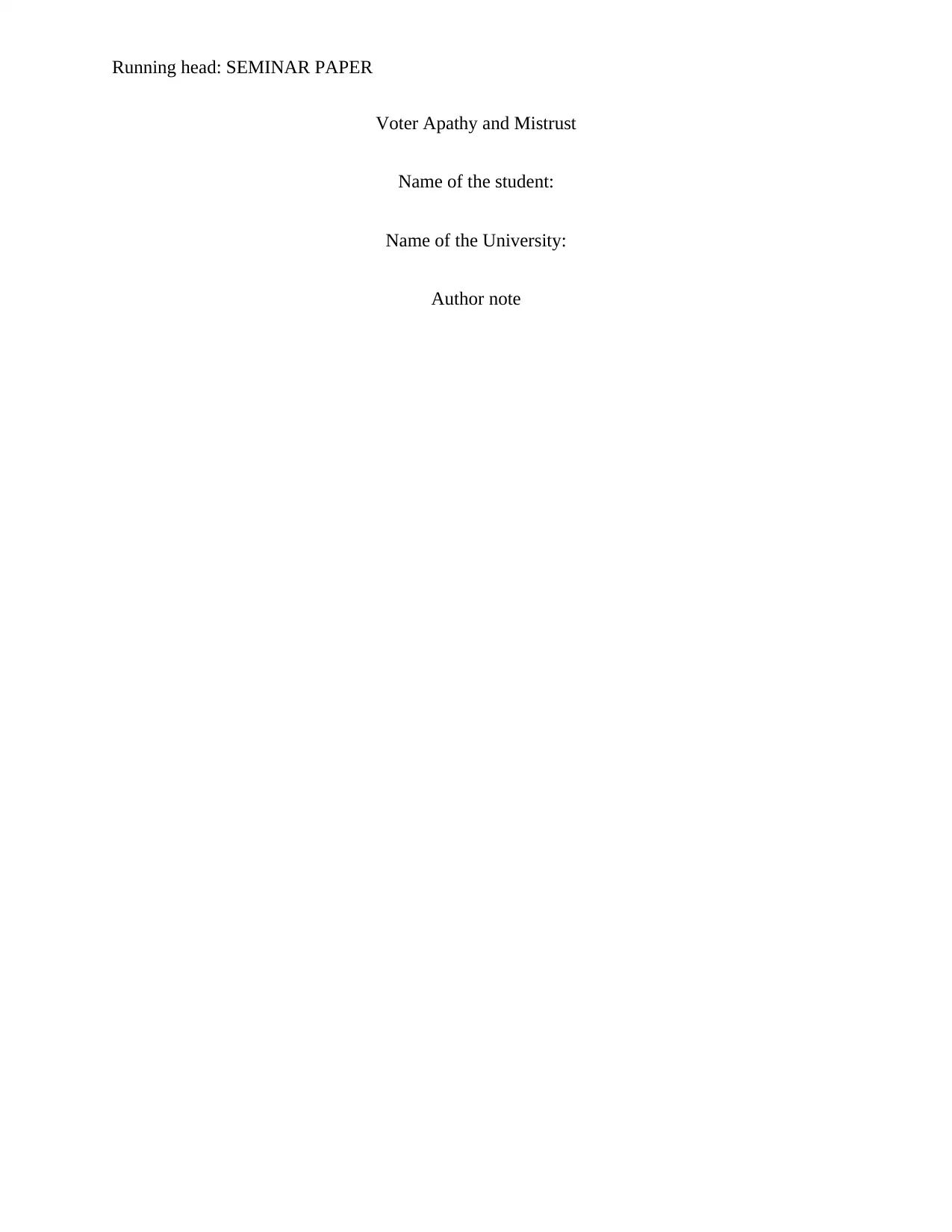
Running head: SEMINAR PAPER
Voter Apathy and Mistrust
Name of the student:
Name of the University:
Author note
Voter Apathy and Mistrust
Name of the student:
Name of the University:
Author note
Paraphrase This Document
Need a fresh take? Get an instant paraphrase of this document with our AI Paraphraser
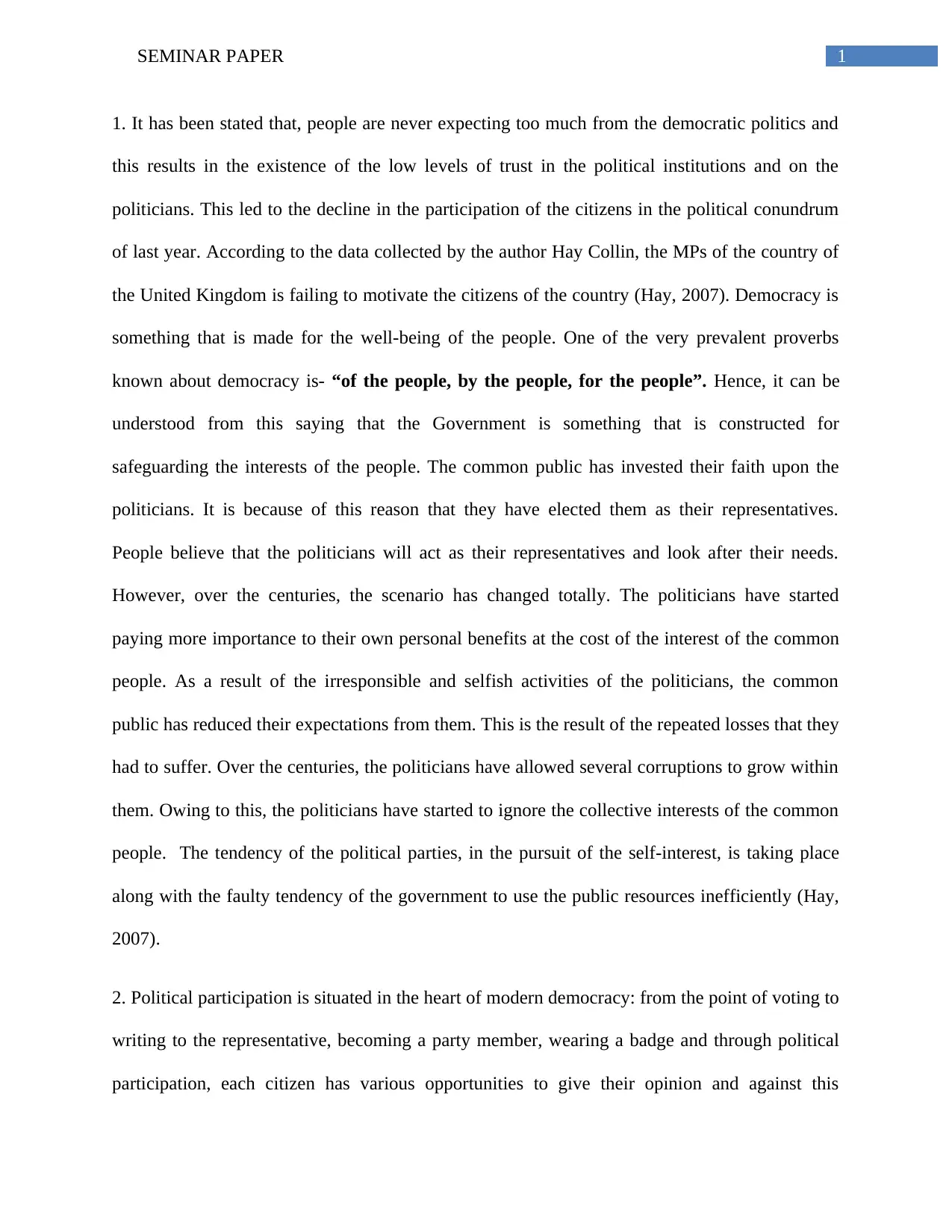
1SEMINAR PAPER
1. It has been stated that, people are never expecting too much from the democratic politics and
this results in the existence of the low levels of trust in the political institutions and on the
politicians. This led to the decline in the participation of the citizens in the political conundrum
of last year. According to the data collected by the author Hay Collin, the MPs of the country of
the United Kingdom is failing to motivate the citizens of the country (Hay, 2007). Democracy is
something that is made for the well-being of the people. One of the very prevalent proverbs
known about democracy is- “of the people, by the people, for the people”. Hence, it can be
understood from this saying that the Government is something that is constructed for
safeguarding the interests of the people. The common public has invested their faith upon the
politicians. It is because of this reason that they have elected them as their representatives.
People believe that the politicians will act as their representatives and look after their needs.
However, over the centuries, the scenario has changed totally. The politicians have started
paying more importance to their own personal benefits at the cost of the interest of the common
people. As a result of the irresponsible and selfish activities of the politicians, the common
public has reduced their expectations from them. This is the result of the repeated losses that they
had to suffer. Over the centuries, the politicians have allowed several corruptions to grow within
them. Owing to this, the politicians have started to ignore the collective interests of the common
people. The tendency of the political parties, in the pursuit of the self-interest, is taking place
along with the faulty tendency of the government to use the public resources inefficiently (Hay,
2007).
2. Political participation is situated in the heart of modern democracy: from the point of voting to
writing to the representative, becoming a party member, wearing a badge and through political
participation, each citizen has various opportunities to give their opinion and against this
1. It has been stated that, people are never expecting too much from the democratic politics and
this results in the existence of the low levels of trust in the political institutions and on the
politicians. This led to the decline in the participation of the citizens in the political conundrum
of last year. According to the data collected by the author Hay Collin, the MPs of the country of
the United Kingdom is failing to motivate the citizens of the country (Hay, 2007). Democracy is
something that is made for the well-being of the people. One of the very prevalent proverbs
known about democracy is- “of the people, by the people, for the people”. Hence, it can be
understood from this saying that the Government is something that is constructed for
safeguarding the interests of the people. The common public has invested their faith upon the
politicians. It is because of this reason that they have elected them as their representatives.
People believe that the politicians will act as their representatives and look after their needs.
However, over the centuries, the scenario has changed totally. The politicians have started
paying more importance to their own personal benefits at the cost of the interest of the common
people. As a result of the irresponsible and selfish activities of the politicians, the common
public has reduced their expectations from them. This is the result of the repeated losses that they
had to suffer. Over the centuries, the politicians have allowed several corruptions to grow within
them. Owing to this, the politicians have started to ignore the collective interests of the common
people. The tendency of the political parties, in the pursuit of the self-interest, is taking place
along with the faulty tendency of the government to use the public resources inefficiently (Hay,
2007).
2. Political participation is situated in the heart of modern democracy: from the point of voting to
writing to the representative, becoming a party member, wearing a badge and through political
participation, each citizen has various opportunities to give their opinion and against this
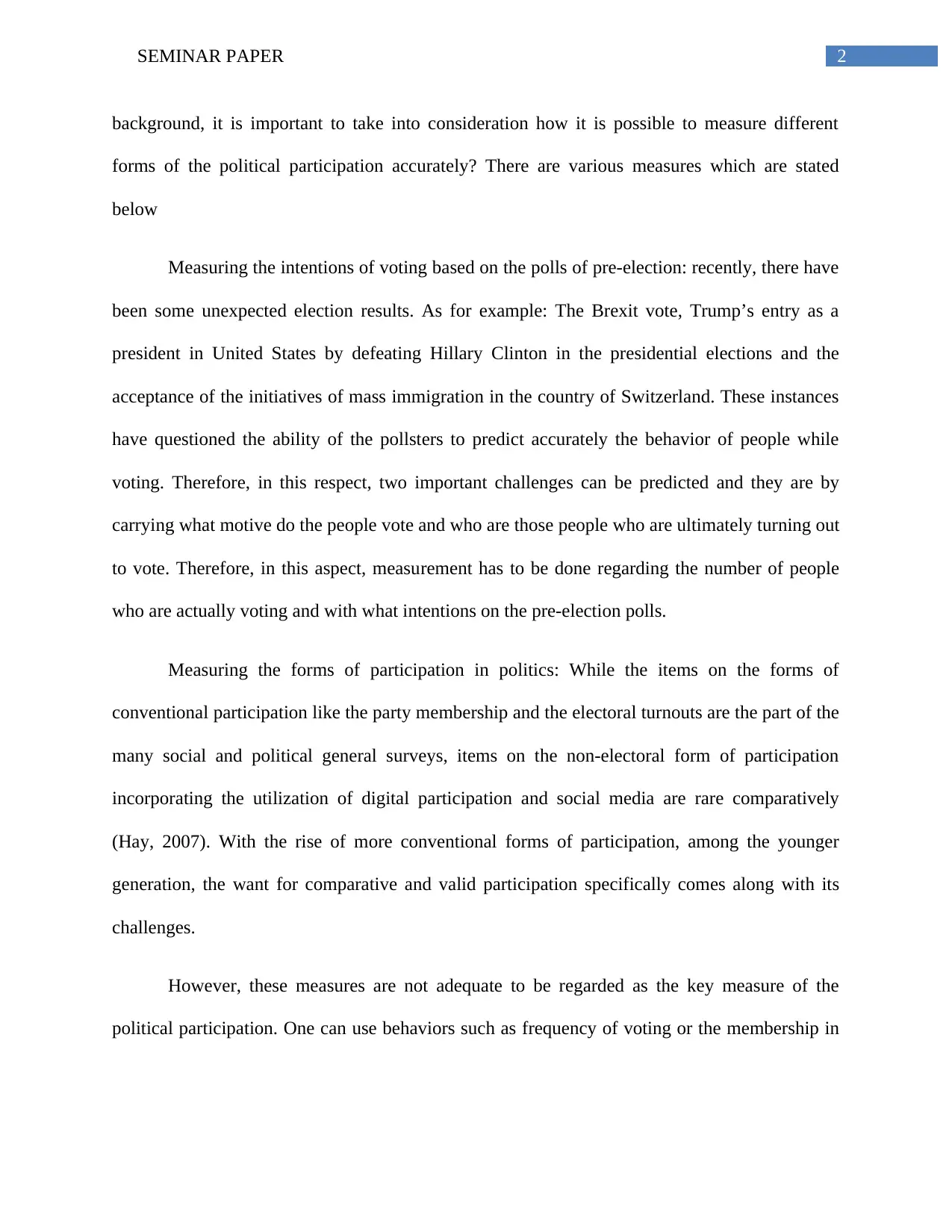
2SEMINAR PAPER
background, it is important to take into consideration how it is possible to measure different
forms of the political participation accurately? There are various measures which are stated
below
Measuring the intentions of voting based on the polls of pre-election: recently, there have
been some unexpected election results. As for example: The Brexit vote, Trump’s entry as a
president in United States by defeating Hillary Clinton in the presidential elections and the
acceptance of the initiatives of mass immigration in the country of Switzerland. These instances
have questioned the ability of the pollsters to predict accurately the behavior of people while
voting. Therefore, in this respect, two important challenges can be predicted and they are by
carrying what motive do the people vote and who are those people who are ultimately turning out
to vote. Therefore, in this aspect, measurement has to be done regarding the number of people
who are actually voting and with what intentions on the pre-election polls.
Measuring the forms of participation in politics: While the items on the forms of
conventional participation like the party membership and the electoral turnouts are the part of the
many social and political general surveys, items on the non-electoral form of participation
incorporating the utilization of digital participation and social media are rare comparatively
(Hay, 2007). With the rise of more conventional forms of participation, among the younger
generation, the want for comparative and valid participation specifically comes along with its
challenges.
However, these measures are not adequate to be regarded as the key measure of the
political participation. One can use behaviors such as frequency of voting or the membership in
background, it is important to take into consideration how it is possible to measure different
forms of the political participation accurately? There are various measures which are stated
below
Measuring the intentions of voting based on the polls of pre-election: recently, there have
been some unexpected election results. As for example: The Brexit vote, Trump’s entry as a
president in United States by defeating Hillary Clinton in the presidential elections and the
acceptance of the initiatives of mass immigration in the country of Switzerland. These instances
have questioned the ability of the pollsters to predict accurately the behavior of people while
voting. Therefore, in this respect, two important challenges can be predicted and they are by
carrying what motive do the people vote and who are those people who are ultimately turning out
to vote. Therefore, in this aspect, measurement has to be done regarding the number of people
who are actually voting and with what intentions on the pre-election polls.
Measuring the forms of participation in politics: While the items on the forms of
conventional participation like the party membership and the electoral turnouts are the part of the
many social and political general surveys, items on the non-electoral form of participation
incorporating the utilization of digital participation and social media are rare comparatively
(Hay, 2007). With the rise of more conventional forms of participation, among the younger
generation, the want for comparative and valid participation specifically comes along with its
challenges.
However, these measures are not adequate to be regarded as the key measure of the
political participation. One can use behaviors such as frequency of voting or the membership in
⊘ This is a preview!⊘
Do you want full access?
Subscribe today to unlock all pages.

Trusted by 1+ million students worldwide
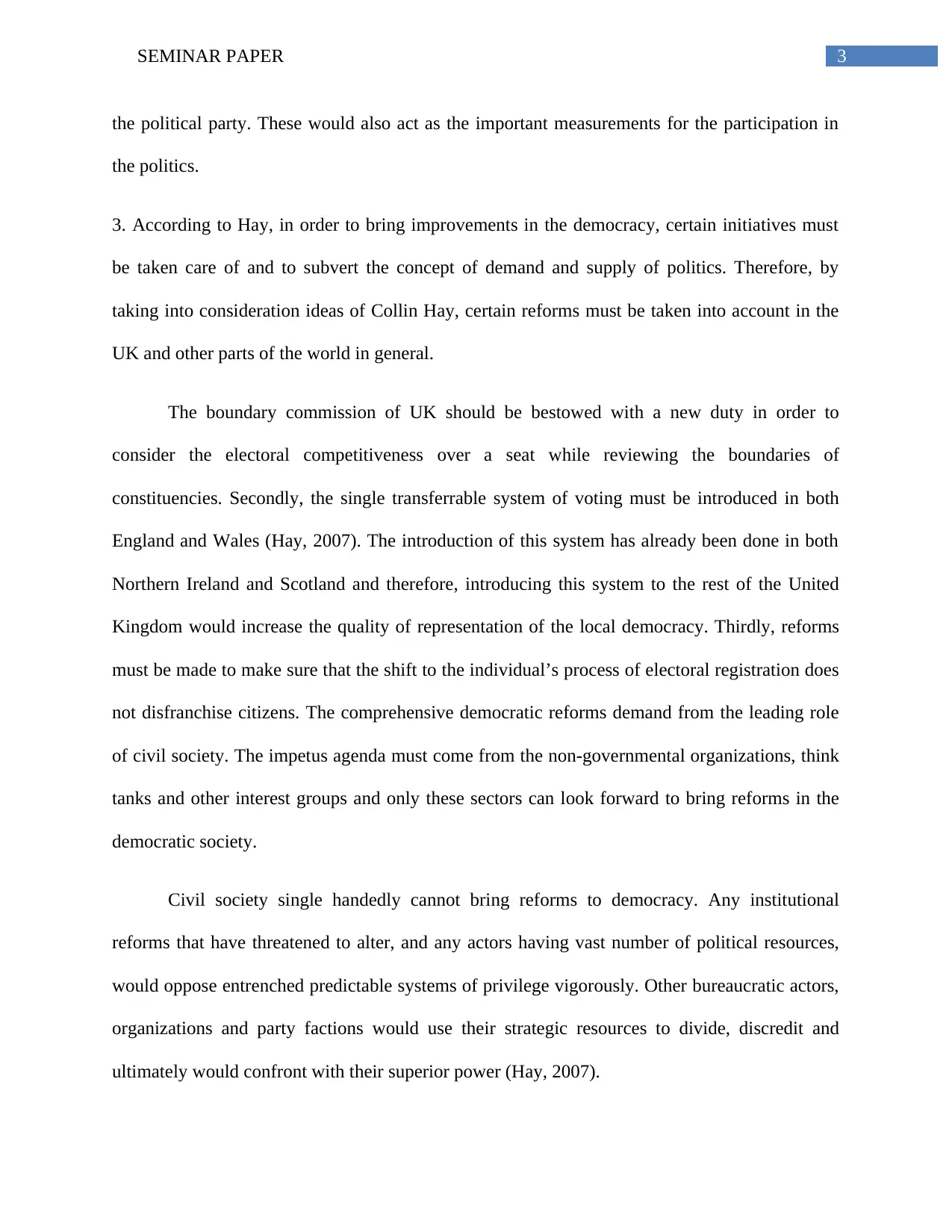
3SEMINAR PAPER
the political party. These would also act as the important measurements for the participation in
the politics.
3. According to Hay, in order to bring improvements in the democracy, certain initiatives must
be taken care of and to subvert the concept of demand and supply of politics. Therefore, by
taking into consideration ideas of Collin Hay, certain reforms must be taken into account in the
UK and other parts of the world in general.
The boundary commission of UK should be bestowed with a new duty in order to
consider the electoral competitiveness over a seat while reviewing the boundaries of
constituencies. Secondly, the single transferrable system of voting must be introduced in both
England and Wales (Hay, 2007). The introduction of this system has already been done in both
Northern Ireland and Scotland and therefore, introducing this system to the rest of the United
Kingdom would increase the quality of representation of the local democracy. Thirdly, reforms
must be made to make sure that the shift to the individual’s process of electoral registration does
not disfranchise citizens. The comprehensive democratic reforms demand from the leading role
of civil society. The impetus agenda must come from the non-governmental organizations, think
tanks and other interest groups and only these sectors can look forward to bring reforms in the
democratic society.
Civil society single handedly cannot bring reforms to democracy. Any institutional
reforms that have threatened to alter, and any actors having vast number of political resources,
would oppose entrenched predictable systems of privilege vigorously. Other bureaucratic actors,
organizations and party factions would use their strategic resources to divide, discredit and
ultimately would confront with their superior power (Hay, 2007).
the political party. These would also act as the important measurements for the participation in
the politics.
3. According to Hay, in order to bring improvements in the democracy, certain initiatives must
be taken care of and to subvert the concept of demand and supply of politics. Therefore, by
taking into consideration ideas of Collin Hay, certain reforms must be taken into account in the
UK and other parts of the world in general.
The boundary commission of UK should be bestowed with a new duty in order to
consider the electoral competitiveness over a seat while reviewing the boundaries of
constituencies. Secondly, the single transferrable system of voting must be introduced in both
England and Wales (Hay, 2007). The introduction of this system has already been done in both
Northern Ireland and Scotland and therefore, introducing this system to the rest of the United
Kingdom would increase the quality of representation of the local democracy. Thirdly, reforms
must be made to make sure that the shift to the individual’s process of electoral registration does
not disfranchise citizens. The comprehensive democratic reforms demand from the leading role
of civil society. The impetus agenda must come from the non-governmental organizations, think
tanks and other interest groups and only these sectors can look forward to bring reforms in the
democratic society.
Civil society single handedly cannot bring reforms to democracy. Any institutional
reforms that have threatened to alter, and any actors having vast number of political resources,
would oppose entrenched predictable systems of privilege vigorously. Other bureaucratic actors,
organizations and party factions would use their strategic resources to divide, discredit and
ultimately would confront with their superior power (Hay, 2007).
Paraphrase This Document
Need a fresh take? Get an instant paraphrase of this document with our AI Paraphraser
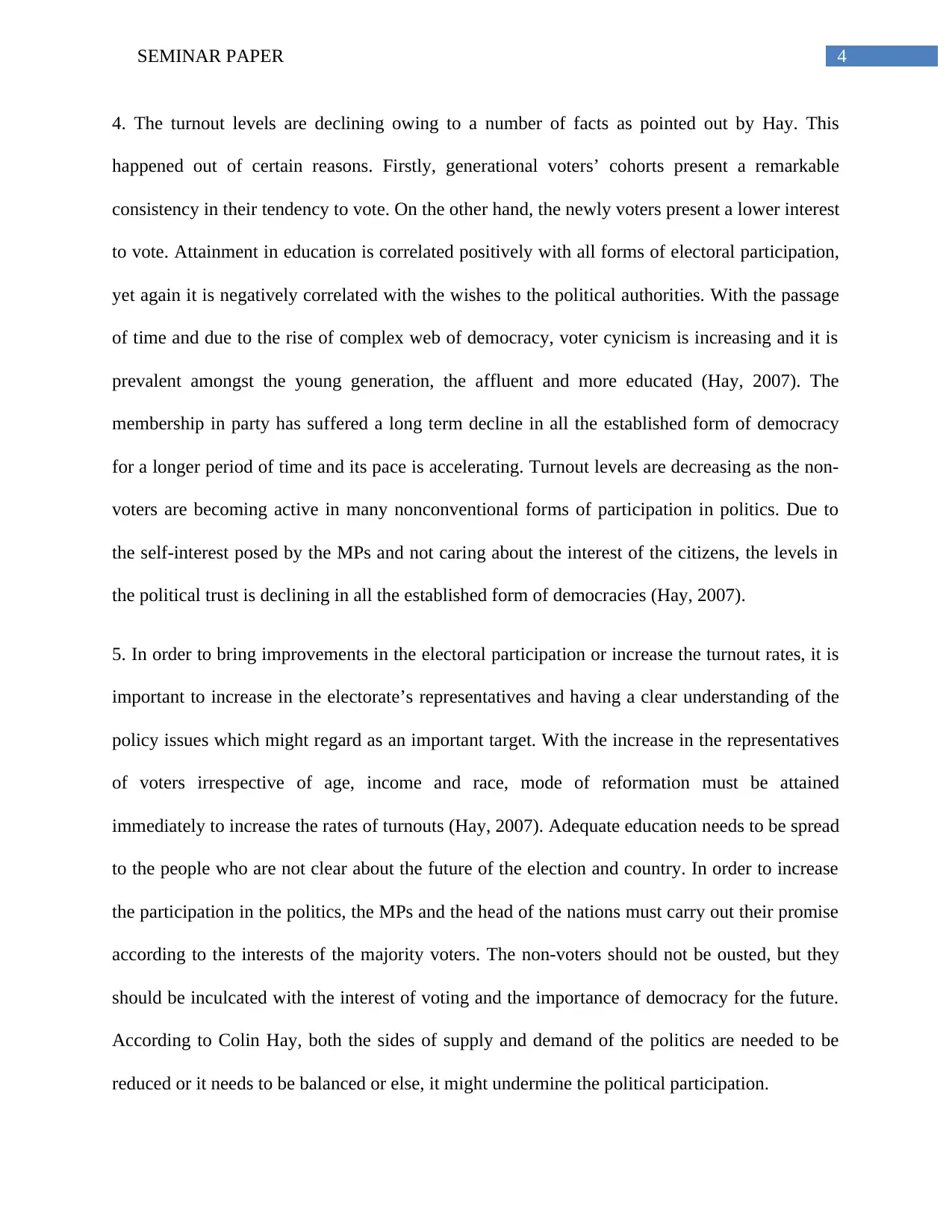
4SEMINAR PAPER
4. The turnout levels are declining owing to a number of facts as pointed out by Hay. This
happened out of certain reasons. Firstly, generational voters’ cohorts present a remarkable
consistency in their tendency to vote. On the other hand, the newly voters present a lower interest
to vote. Attainment in education is correlated positively with all forms of electoral participation,
yet again it is negatively correlated with the wishes to the political authorities. With the passage
of time and due to the rise of complex web of democracy, voter cynicism is increasing and it is
prevalent amongst the young generation, the affluent and more educated (Hay, 2007). The
membership in party has suffered a long term decline in all the established form of democracy
for a longer period of time and its pace is accelerating. Turnout levels are decreasing as the non-
voters are becoming active in many nonconventional forms of participation in politics. Due to
the self-interest posed by the MPs and not caring about the interest of the citizens, the levels in
the political trust is declining in all the established form of democracies (Hay, 2007).
5. In order to bring improvements in the electoral participation or increase the turnout rates, it is
important to increase in the electorate’s representatives and having a clear understanding of the
policy issues which might regard as an important target. With the increase in the representatives
of voters irrespective of age, income and race, mode of reformation must be attained
immediately to increase the rates of turnouts (Hay, 2007). Adequate education needs to be spread
to the people who are not clear about the future of the election and country. In order to increase
the participation in the politics, the MPs and the head of the nations must carry out their promise
according to the interests of the majority voters. The non-voters should not be ousted, but they
should be inculcated with the interest of voting and the importance of democracy for the future.
According to Colin Hay, both the sides of supply and demand of the politics are needed to be
reduced or it needs to be balanced or else, it might undermine the political participation.
4. The turnout levels are declining owing to a number of facts as pointed out by Hay. This
happened out of certain reasons. Firstly, generational voters’ cohorts present a remarkable
consistency in their tendency to vote. On the other hand, the newly voters present a lower interest
to vote. Attainment in education is correlated positively with all forms of electoral participation,
yet again it is negatively correlated with the wishes to the political authorities. With the passage
of time and due to the rise of complex web of democracy, voter cynicism is increasing and it is
prevalent amongst the young generation, the affluent and more educated (Hay, 2007). The
membership in party has suffered a long term decline in all the established form of democracy
for a longer period of time and its pace is accelerating. Turnout levels are decreasing as the non-
voters are becoming active in many nonconventional forms of participation in politics. Due to
the self-interest posed by the MPs and not caring about the interest of the citizens, the levels in
the political trust is declining in all the established form of democracies (Hay, 2007).
5. In order to bring improvements in the electoral participation or increase the turnout rates, it is
important to increase in the electorate’s representatives and having a clear understanding of the
policy issues which might regard as an important target. With the increase in the representatives
of voters irrespective of age, income and race, mode of reformation must be attained
immediately to increase the rates of turnouts (Hay, 2007). Adequate education needs to be spread
to the people who are not clear about the future of the election and country. In order to increase
the participation in the politics, the MPs and the head of the nations must carry out their promise
according to the interests of the majority voters. The non-voters should not be ousted, but they
should be inculcated with the interest of voting and the importance of democracy for the future.
According to Colin Hay, both the sides of supply and demand of the politics are needed to be
reduced or it needs to be balanced or else, it might undermine the political participation.

5SEMINAR PAPER
References
Hay, Colin, (2007) "Chapter 1: Political Disenchantment" from Hay, Colin, Why We Hate
Politics pp.1-60, Cambridge,: Polity. [60]
References
Hay, Colin, (2007) "Chapter 1: Political Disenchantment" from Hay, Colin, Why We Hate
Politics pp.1-60, Cambridge,: Polity. [60]
⊘ This is a preview!⊘
Do you want full access?
Subscribe today to unlock all pages.

Trusted by 1+ million students worldwide
1 out of 6
Related Documents
Your All-in-One AI-Powered Toolkit for Academic Success.
+13062052269
info@desklib.com
Available 24*7 on WhatsApp / Email
![[object Object]](/_next/static/media/star-bottom.7253800d.svg)
Unlock your academic potential
Copyright © 2020–2026 A2Z Services. All Rights Reserved. Developed and managed by ZUCOL.





